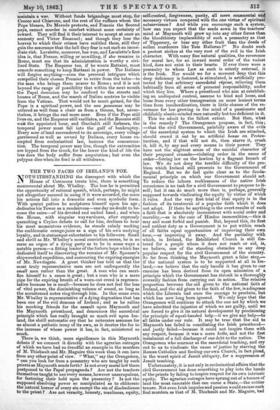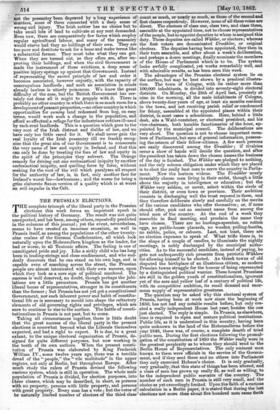THE TWO FACES OF IRELAND'S FOE.
NOTWITHSTANDING the disrespect with which the House of Commons treats him, there is something monumental about Mr. Whalley. The less he is permitted the opportunity of rational speech, which, perhaps, he might not altogether succeed in using if it were accorded, the more his actions fall into a dramatic and even symbolic form. With quaint pathos he sculptures himself upon his age ; dedicates his Tower as a rendezvous—one day no doubt to be- come the cairn—of his devoted and united band ; and when the House, with singular waywardness, after expressly quenching a Ceylon debate to call for him, declines to hear his most momentous evidence, be stands calmly sucking the emblematic orange-juice as a sign of his own undying loyalty, and in statuesque exhortation to his followers. Small and shrill as Mr. Whalley's moral conviction seems, he is so mere an organ of a dying party as to be in some ways a notable person—a fitting leader of the forlorn hope which has dedicated itself to discovering the remains of Mr. Spooner's shipwrecked expedition, and succouring the expiring energies of Mr. Newdegate. A great thinker has told us that the most truly representative men are not unfrequently the small men rather than the great. A man who can sacri- fice himself to a cause is great ; but a man who is a mere pipe for the expiring breath of a worn-out creed is represen- tative because he is small—because he does not feel the loss of vital power, the diminishing volume of sound, so long as the accustomed notes ring through him. In this sense even Mr. Whalley is representative of a dying dogmatism that has been one of the evil demons of Ireland ; and as he rallies his mocking friends for the assault upon Maynooth and the Maynooth priesthood, and denounces the sacerdotal principle which has really brought so much evil upon Ire- land, the shrill automatic cry that he reiterates assumes for us almost a pathetic irony of its own, as it decries the foe to the increase of whose power it has, in fact, ministered so much.
There is, we think, more significance in this Maynooth debate if we connect it directly with the agrarian outrages of which we have had so dreadful an example in the murders of M. Thiebault and Mr. Maguire this week than it can have from any other point of view. " What," say the OrangeMen, " can you look for from a peasantry who are taught by such priests as Maynooth sends forth P Is not every moral law there postponed to the Papal propaganda ? Are not the teachers themselves taugb,t to use every means, however unscrupulous, for fastening their hold upon the peasantry ? Is not the supposed absolving power so manipulated as to obliterate the natural horror of every sin except the sin of disobedience to the priest ? Are not veracity, honesty, manliness, equity, self-control, forgiveness, purity, all mere ornamental and accessory virtues compared with the one virtue of spiritual subservience ? And while you encourage such a system, how can you expect that the seeds sown in the teachers' mind at Maynooth will grow up into any other forms than the bloodthirsty implacability of such a peasantry as that of Tipperary, or bear any other fruit than the deeds of sullen murderers like Tom Halloran ?" No doubt such a protest strikes at the very root of the evil in the Irish character. With many fine natural qualities, the reverence for moral law, for an inward moral order of the rudest kind, does not exist in their hearts. If ever there were a peasantry to whom Law as such is utterly external, it is the Irish. Nor would we for a moment deny that this deep deficiency is fostered, is stimulated, is artificially pro- tected by that arbitrary sacerdotal regime, relieving them habitually from all sense of personal responsibility, under which they live. Where a priesthood who aim at establish- ing an undisputed control, assume to bind and loose, and loose from every other transgression on more lenient terms than from insubordination, there is little chance of the re- verence for law growing in the mind of a passionate and childishly elastic-minded race naturally but too deficient in it. This we admit to the fullest extent. But then, what is the remedy ? The Orangemen propose, in fact, this ; —that the civil Government, painfully aware of the evils of the sacerdotal system to which the Irish are attached, should crowd it out by an artificial bonus on Protes- tantism, and if that will not do, then starve it, crush it, kill it, by any and every means in their power. They have not the slightest sense of the suicidal character of their proposed crusade—violating order in the name of order—forcing law on the lawless by a flagrant breach of law. We do not deny the terrible difficulty of the pro- blem which Ireland still presents to the Government of England. But we do feel quite clear as to the funda- mental principle on which our Government should act. To reduce the inborn recklessness of the native Irish conscience is no task for a civil Government to propose to it- self; but it can do much more than is, perhaps, generally supposed towards vindicating the equity by virtue of which it rules. And the very first trial of that equity is in the fashion of its treatment of a popular faith which it does not adopt. If there be anything in the overt results of such a faith that is absolutely inconsistent with social order and morality,—as in the case of Hindoo immoralities,—this it may and must forbid and punish. But, beyond this, its first and noblest duty as a Government is to put within reach of all faiths equal opportunities of improving their own tone,—or improving it away. And the partiality with which, in Ireland, the Established Church is still fos- tered for a people whom it does not reach or aid, is, we believe, one of the standing obstacles to any deep popular respect for the civil Government of the country. So far from thinking the Maynooth grant a false step,— if the national system is to be supported at all in Ire- land,—we believe that the only handle it has given to our enemies has been derived from its open admission of a principle which the Government has shrunk in a thoroughly cowardly fashion from carrying out in action. The relative proportion between the aid given to the national faith of Ireland, and the aid given to the faith of the few, is adisgrace which the Liberals had once the courage to proclaim, but which has now long been ignored. We only hope that the Orangemen will continue to attack the one act by which we have admitted the injustice of which we are guilty, until we are forced to give it its natural development by proclaiming the principle of equal-handed help—if we give any help—to all faiths under our rule. It may be true that the aid to Maynooth has failed in conciliating the Irish priesthood— and justly failed—because it could not inspire them with any respect, because it was a mere bribe, and not the first instalment of a full discharge of our debt to the nation. The Orangemen who murmur at the sacerdotal teaching, and cry out to us to vindicate the cause of justice by starving the Roman Catholics and feeding our own Church, in fact plead, in the worst spirit of Jesuit obliquity, for a suppression of Jesuit teaching. Unfortunately, it is not only in ecclesiastical affairs that the civil Government has done something to play into the hands of the priests by failing to inspire respect for its own intrinsic equity. The agrarian outrages have sprung out of a tenure of land the most execrable that can curse a State the cottier tenure. Not even Irish impulse and passion would excuse such foul murders as that of M. Thiebault and Mr. Maguire, had not the peasantry been depraved by a long experience of murders, some of them connected with a deep sense of wrong and injury. The Irish cottier has no choice but 'to take small lots of land to cultivate at any rent demanded. Even now, there are comparatively few farms which employ regular agricultural labour, and many of the peasantry would starve had they no holdings of their own. They are too poor and destitute to ask for a lease and make terms like a substantial farmer. They must take what they can get. When they are turned out, as they often are, after im- proving their holdings, and when the civil Government is made the instrument of these evictions, a deep sense of positive injury springs up against that Government. Instead of representing the sacred principle of law and order it becomes associated, however unjustly, with the rapacity of unscrupulous landlords ; and such an association in minds already lawless is utterly poisonous. We know the great difficulty of the case, but the British Government has cer- tainly not done all it might to grapple with it. There is probably no other country in which there is so much room for a development of peasant-properties,—no other country in which opportunities for owning land redeemed from bog, on easy. terms, would work such a change in the population, and afford so effectual a refuge for the industrious cottiers ill-used by rack-rent landlords. This is a question which goes to the very root of the Irish distrust and dislike of law, and we have only too little cared for it. We shall never gain the real loyalty of the Irish peasantry till we frankly recog- nize that the great aim of our Government is to consecrate the very name of law and equity in Ireland, and that this can only be done by treating the foes of law and equity in the spirit of the principles they subvert. The Orange remedy for driving out one ecclesiastical iniquity by another ecclesiastical iniquity, and quelling force by force, without seeking for the root of the evil which paralyzes all respect for the authority of law, is, in fact, only another face for Ireland's worst foe—lawlessness ; and the worse for being a grim elaborate Saxon-version of a quality which is at worst an evil impulse in the Celt.































 Previous page
Previous page